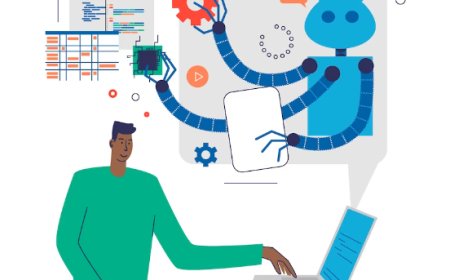The Intersection of Data Analytics and Artificial Intelligence
Explore the synergy between data analytics and artificial intelligence in data science. Uncover real-world applications, challenges, and the transformative impact of this intersection on decision-making.

The blending of Data Analytics and Artificial Intelligence (AI) stands as a pivotal driver of innovation and transformation. This collaborative partnership is instrumental in extracting profound insights, facilitating informed decision-making, and molding the future scenery across diverse industries. Data Analytics, with its focus on processing and interpreting vast datasets, joins forces with AI, which brings intelligence and predictive capabilities to the table. Together, they create a powerful synergy that not only enhances analytical processes but also empowers businesses to traverse complexities with agility. This convergence, grounded in practical applications, underscores a pragmatic approach to leveraging technology for a tangible, real-world impact-changing digital environment.
The Evolving Terrain of Technology
The abundance of data has become a defining feature for organizations. This surge in information, while beneficial, brings forth a fundamental challenge: the extraction of meaningful insights from this vast sea of data. In response to this challenge, Data Analytics Emerged as a pivotal discipline. It involves a systematic process of examining, cleaning, transforming, and modeling data to draw valuable conclusions. However, as the volume and intricacy of data continue to escalate, there arises a demand for tools that can handle this complexity.
This is precisely where Artificial Intelligence (AI) plays a crucial role. AI complements Data Analytics by introducing a layer of intelligence that enables more nuanced and sophisticated analysis. It empowers systems to discern patterns, make predictions, and automate decision-making processes. In essence, as the data evolves, the integration of AI into Data Analytics becomes not just beneficial but imperative for organizations seeking deeper insights and more informed decision-making.
The Need for Intelligence Amidst Data Deluge
The surge in data volume has outpaced the capabilities of conventional analytics tools, prompting the integration of Artificial Intelligence (AI). AI, mirroring human cognitive functions, augments analytics by identifying patterns, predicting outcomes, and automating decision-making. However, this amalgamation is not seamless. Pertinent challenges, such as data privacy concerns, ethical considerations, and the interpretability of AI-generated insights, take center stage in discussions.
Data privacy becomes a paramount issue as AI delves into vast datasets, necessitating stringent measures to safeguard sensitive information. Ethical considerations arise from the potential biases in AI algorithms and the ethical use of data. The interpretability of AI-generated insights poses a challenge, as understanding the rationale behind AI-driven decisions becomes crucial for gaining trust and ensuring responsible deployment. These challenges are integral to realizing the full potential of the symbiotic relationship between Data Analytics and AI, ensuring a balance between innovation and ethical considerations.
Can Organizations Efficiently Use AI to Enhance Analytics?
Organizations struggle with crucial issues regarding smooth synergy at the nexus of data analytics and artificial intelligence. Specializing in the efficient use of AI to improve analytics capabilities becomes important. Companies want to comprehend the smooth integration of AI into their analytical frameworks so they can utilize its ability to extract valuable insights from growing datasets. This mission is not without difficulties, though. A systematic approach is needed to address the associated problems, which range from data privacy concerns to guaranteeing the interpretability of insights generated by AI.
The ethical considerations are quite important. The development of strong ethical frameworks is essential for the responsible application of AI in data analytics. Businesses struggle to establish guidelines for AI applications that maintain privacy, equity, and transparency. The merging of AI and data analytics necessitates careful study of these problems. Finding the right balance between creativity and moral obligation is necessary to fully explore the plethora of prospects and potential hazards. Organizations can discover the key to realizing this intense synergy's full potential within this delicate equilibrium.
The Collaborative Future of Data-Driven Intelligence
The combination of artificial intelligence and data analytics offers revolutionary consequences for the direction of technology. This symbiotic partnership has the power to drastically alter several facets of our technology environment. We may learn more about this partnership's complex effects on predictive analytics, data-driven decision-making, and the moral issues that responsible integration requires by rigorously analyzing it. The story of this partnership as it develops shows creativity, effectiveness, and a well-balanced combination of human knowledge and the accuracy and scalability of artificial intelligence. This opens the door to a future in which data is strategically useful rather than a source of difficulty.
Enhanced Predictive Analytics
The infusion of Artificial Intelligence (AI) into predictive analytics represents a significant enhancement. Machine Learning algorithms, a key facet of AI, excel in recognizing patterns and forecasting outcomes using historical data. This integration empowers organizations to gain foresight into future trends and behaviors, thereby enriching their decision-making capabilities. By leveraging AI's analytical prowess, businesses can make more informed choices, responding adeptly to emerging scenarios. This augmentation in predictive analytics not only refines the accuracy of projections but also equips organizations with a strategic advantage, aligning their actions with anticipated developments.
Automated Decision-Making
The automation of decision-making processes is a notable and influential result of integrating AI with data analytics. Organizations may effectively evaluate enormous volumes of data in real-time by utilizing AI algorithms. This feature enables quick and informed decision-making, a level of operation that was previously unattainable with conventional techniques. To successfully manage the fast-paced and dynamic nature of the modern business environment, organizations must make the transition from the analytical stage to the implementation of tangible activities.
Ethical Considerations
Integrating AI with data analytics highlights how important ethics are. It's critical to strike a careful balance between innovation and responsible use. It is vital to prioritize data protection, establish strong ethical standards, and promote openness in AI systems. Establishing a foundation based on ethics is essential to ensuring that artificial intelligence is used wisely in data analytics. This moral foundation protects against abuse and creates an atmosphere where stakeholders may trust that AI technologies are being used responsibly. The focus on ethics becomes a guiding concept in the field of data analytics, directing technical progress toward a future that is ethical and reliable.
Human-AI Collaboration
While AI augments analytical capabilities, the importance of human expertise remains irreplaceable. The future envisions a harmonious collaboration between humans and AI systems. Humans bring contextual understanding, creativity, and ethical judgment to the table, complementing the speed, precision, and scalability that AI offers. This collaborative synergy creates a potent force that maximizes the strengths of both realms.
Organizations' use of data is changing dramatically as a result of the convergence of AI and data analytics. The convergence of these two domains presents unmatched prospects for ingenuity, efficacy, and rivalry. But as we go through this changing environment, it's critical to approach the problems that come with it head-on. Organizations may steer towards a responsible and strong data-driven future by embracing the revolutionary potential of this confluence, creating ethical norms, and fostering a collaborative partnership between humans and AI. The options are endless, just like the data itself, as the adventure continues.











































